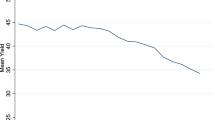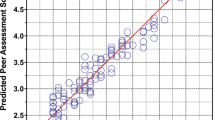Abstract
This study uses hierarchical multivariate regression to examine whether traditional measures of college and university performance are salient predictors of Historically Black Colleges and Universities (HBCU) US News and World Reports peer reputation scores when HBCUs are rated exclusively by HBCU administrators. Due in large part to their unique history and mission, HBCUs often underperform in relation to non-HBCUs on traditional performance measures such as selectivity, graduation rates, and institutional wealth. By using these markers as the primary means for determining the effectiveness of colleges and universities, it has been argued that the larger higher education community unfairly mischaracterizes HBCUs as lower quality institutions. This has led many in the HBCU community to call for a rejection of these traditional standards of assessing institutional quality. The findings of this study, however, suggest that HBCU administrators rely heavily on these traditional measures when asked to assess the quality of other HBCUs. The potential implications of this are discussed.
Similar content being viewed by others
Notes
In the rankings of master's and baccalaureate colleges, graduation rate performance is not included as a variable.
While the exact wording used by the USNWR for the HBCU peer reputation survey is not publicly available, the format likely follows that of the larger peer reputation survey where administrators are asked to “Please rate the academic quality of undergraduate programs at the following schools…Please review the entire list first, considering each program's scholarship record, curriculum, and quality of faculty and graduates.” (Chatman 2004)
Regression diagnostics revealed that model estimated met the assumptions of OLS regression.
References
Baade, R., & Sundberg, J. (1996). What determines alumni generosity? Economics of Education Review, 15(1), 75–81.
Brown, M., & Freeman, K. (2002). Guest editors' introduction. The Review of Higher Education, 25(3), 237–368.
Chang, G. C., & Osborn, J. (2005). Spectacular colleges and spectacular rankings. Journal of Consumer Culture, 5(3), 338–364.
Chatman, S. (2004). US News & World Report Rankings. http://www.sariweb.ucdavis.edu/codvc/FullDocument.pdf. Accessed 26 March 2011
Chivvis, D. (2010). Return of college-rankings season brings out critics. http://www.aolnews.com/nation/article/us-news-and-world-reports-college-rankings-bring-out-critics/19463057. Accessed 5 May 2010
Dichev, I. (2001). News or noise? Estimating the noise in the US News university rankings. Research in Higher Education, 42(3), 237–266.
Dixson, A. D., & Rousseau, C. K. (2005). And we are still not saved: critical race theory in education 10 years later. Race Ethnicity and Education, 8(1), 7–27.
Gansemer-Topf, A., & Schuh, J. (2006). Institutional selectivity and institutional expenditures: examining organizational factors that contribute to retention and graduation. Research in Higher Education, 47(6), 613–642.
Gasman, M., Baez, B., & Turner, C. S. V. (Eds.). (2008). Understanding minority-serving institutions. Albany: State University of New York Press.
Hoover, E. (2007). Anti-rankings campaign stirs new criticisms of “US News” guides. The Chronicle of Higher Education. http://chronicle.com/article/Anti-Rankings-Campaign-Stirs/20141. Accessed 20 June 2010.
Jaschik, S. (2007). Growing challenge to ‘U.S. News’. Inside Higher Ed. http://www.insidehighered.com/news/2007/05/18/usnews. Accessed 20 May 2011.
Jencks, C., & Riesman, D. (1967). The American Negro College. Harvard Educational Review, 37(3), 3–60.
Kamara, M. (2007a, June 27). Are U.S. News' rankings inherently biased against Black Colleges?, Diverse: Issues in Higher Education. http://diverseeducation.com/artman/publish/article_7831.shtml. Accessed 21 May 2011
Kamara, M. (2007b, October 3). New HBCU rankings get mixed reviews. Diverse: Issues in Higher Education. http://diverseeducation.com/article/9681/new-hbcu-rankings-get-mixed-reviews.html. Accessed 21 May 2011
Kujovich, G. (1993). Public Black colleges: The long history of unequal funding. The Journal of Blacks in Higher Education (2), 73–82.
Ladson-Billings, G. (1998). Just what is critical race theory and what's it doing in a nice field like education? International Journal of Qualitative Studies in Education, 11(1), 7–24.
Larsen, P. (2003). Academic reputation: how US news and world report survey respondents form perceptions. International Journal of Educational Advancement, 4(2), 155–165.
Marable, M. (1992). Black America. Westfield: Open Media.
Matsuda, M. J., Lawrence, C., Delgado, R., & Crenshaw, K. (Eds.). (1993). Words that wound: critical race theory, assaultive speech, and the first amendment. Boulder: Westview Press.
Monks, J., & Ehrenberg, R. (1999). The impact of US news and world report college rankings on admission outcomes and pricing decisions at selective private institutions. Cambridge: National Bureau of Economic Research.
Morse, R., & Flanigan, S. (2008). How we calculate the rankings. http://www.usnews.com/articles/education/best-colleges/2008/08/21/how-we-calculate-the-rankings.html?PageNr=1. Accessed 20 July 2009
Parker, L., Deyhle, D., & Villenas, S. A. (Eds.). (1999). Race is–race isn't: critical race theory and qualitative studies in education. Boulder: Westview Press.
Porter, S. R., & Toutkoushian, R. K. (2006). Institutional research productivity and the connection to average student quality and overall reputation. Economics of Education Review, 25(6), 605–617.
Ricard, R. B., & Brown, M. C. (2008). Ebony towers in higher education: the evolution, mission, and presidency of historically black colleges and universities. Sterling: Stylus Publishers.
Riley, J. (2010). Black Colleges Need a New Mission The Wall Street Journal. http://online.wsj.com/article/SB10001424052748704654004575517822124077834.html. Accessed 5 April 2012
Russell, M. (1991). Entering great America: reflections on race and the convergence of progressive legal theory and practice. Hastings Law Journal, 43, 749–767.
Sav, T. (2000). Tests of fiscal discrimination in higher education finance: funding historically black colleges and universities. Journal of Education Finance, 26(2), 157–172.
Barron's Educational Series. (2007). Profiles of American colleges (29th ed.). Hauppauge: Barron's Educational Series, Inc.
Solorzano, D. G., & Yosso, T. J. (2001). Critical race and LatCrit theory and method: counter-storytelling. International Journal of Qualitative Studies in Education, 14(4), 471–495.
Standifird, S. (2005). Reputation among peer academic institutions: an investigation of the US news and world report's rankings. Corporate Reputation Review, 8(3), 233–244.
The Education Conservancy. (1997). The education conservancy president's letter. http://www.educationconservancy.org/presidents_letter.html. Accessed 16 September 2010
Volkwein, J., & Sweitzer, K. (2006). Institutional prestige and reputation among research universities and liberal arts colleges. Research in Higher Education, 47(2), 129–148.
Walton, C. N. (2011). In their own words: perspectives on HBCU institutional quality from HBCU Administrators. (Doctorial Dissertation), University of Tennessee - Knoxville.
Weisbrod, B. A., & Asch, E. D. (2009). Gaming the Rankings. Inside Higher Ed. http://www.insidehighered.com/views/2009/06/09/asch. Accessed 15 April 2012
Williams, J., Ashley, D., & Rhea, S. (2004). I'll Find a way or make one: a tribute to historically black colleges and universities (1st ed.). New York: Amistad.
Author information
Authors and Affiliations
Corresponding author
Rights and permissions
About this article
Cite this article
Jones, W.A. Prestige Among Black Colleges: Examining the Predictors of HBCU Peer Academic Reputation. J Afr Am St 17, 129–141 (2013). https://doi.org/10.1007/s12111-012-9231-4
Published:
Issue Date:
DOI: https://doi.org/10.1007/s12111-012-9231-4




